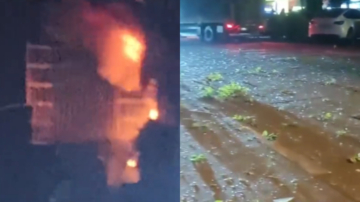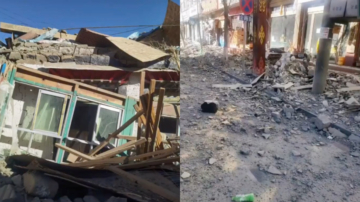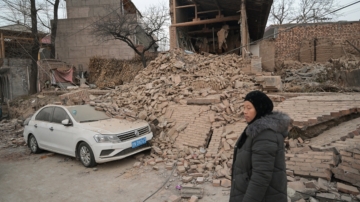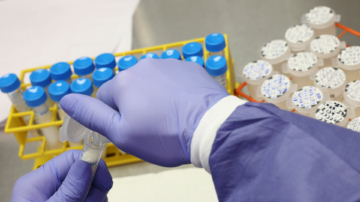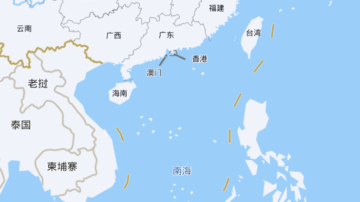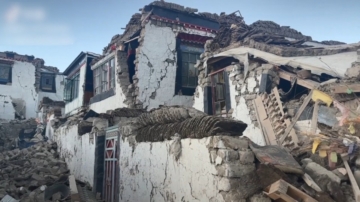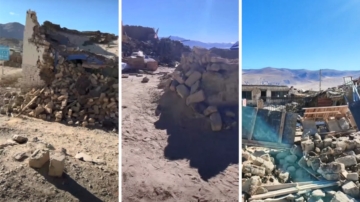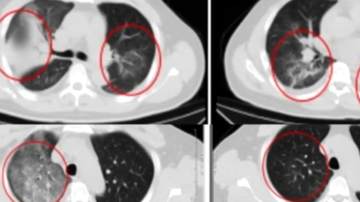【新唐人2015年01月08日讯】去年的最后一天,上海外滩发生了踩踏事故,造成至少36人死亡,49人受伤。1月6号,是事故遇难者的“头七”,但上海当局却无情的维稳,同时极力阻止家属向媒体申诉。有批评说,“上海踩踏”后出现的种种“人权踩踏”,使得人们无法乐观以待。
6号早上,上海当局在上海外滩陈毅广场架起了铁栏,把整个广场包括事发地点南侧台阶隔开,并调动上百警察在场戒备,严禁一般市民进入,而遇难者家属也要在民警的引导下,才能进场。
警方要求每个遇难者家庭分批进场悼念,而且只给每个家庭5分钟时间献花祭拜,时间一到,工作人员就会立即把他们带走。一些家属嚎啕大哭,瘫软在地,也有家属崩溃晕倒,被几名医护人员用担架抬上救护车。
与此同时,上海当局将外国和香港传媒隔绝在广场远处的一个小区域,以防止家属走近申诉。有家属向远处的记者呼叫,但她很快被警方带走。
上海踩踏事件死者妻子范萍:“我现在最大就是希望,政府能够给我一个说法,为甚么我老公进去的时候人是有生命迹象的,等到24小时以后,我们在殡仪馆见到我老公,在医院中是没有任何一个人说,我们病人在里面是一个甚么样的情况。”
一名来自四川成都的男子向《法国国际广播电台》表示,当局对死难者家属进行严格监控。他说:“我们被安排住在不同的地点,我们每到哪里,都有3个人跟着。”
上海独立评论员赵楚(Zhao Chu)向《美联社》指出,这样一个大型公共安全事故可以拉扯民众的心弦,受害者家属的言行可令民众情绪摇摆,使得当局把控制家属、限制他们彼此接触或接触媒体当作首要任务。
自由撰稿人朱欣欣:“在目前这种维稳体制下,官方把任何事情的发生,首先考虑的不是民众的感受,民众的意见,首先考虑到是对他们政权稳固性、合法性的影响,所以首先是对不同的意见要严密封锁,唯恐引发民意的不满,成为整个社会矛盾爆发的一个导火索。”
据英国《金融时报》报导,多数媒体被允许报导事件经过,但是,它们不能推测踩踏事件的原因,也不能发表家属抱怨的报导﹔这些抱怨的对象包括:官方未能防止踩踏事件,急救服务反应迟缓,以及家属到医院探访遇难者受阻等。
《法广》报导指出,“上海踩踏”后出现了种种的“人权踩踏”,上海当局在预防踩踏事故上不仅无能且不负责,但在封锁消息上却纯熟老道。
朱欣欣:“中共现在十分的恐惧,它就感觉到周围到处都是导火索,等待某一个突发事件的点燃,所以它这种处理的做法,我们可以理解,是完全一种不自信,这恰恰说明目前中共这种虚弱的状态。”
大陆《维权网》6号报导,因怀疑民间有人在调查上海踩踏事件实际死亡人数,陈健芳、邱蓓、汪建华等多位上海维权人士遭到警方讯问、失联或被软禁。
上海维权人士陈健芳家人:“他们过来看一看,家里来看一下,是说不让他出去嘛,大致情况我也不大清楚,他们就说甚么31号踩死人了,他们要去慰问,悼念甚么的。我们那里信号基本上没有,打不通的。”
据上海殡葬管理规定,所有遇难者遗体要在上海火化。有家属透露,政府向他们施压,要求尽早将遗体火化或出殡,但家属担心,一旦把遗体火化,日后就死无对证,难以追讨。
上海市民谈蓝英:“这次外滩事件非常痛心,现在都生一个孩子,独生子女,人家一个孩子失去了,那是甚么心情,他们比禽兽都不如啊,共产党就是流氓、土匪、强盗。”
据香港《蘋果日报》报导,上海当地报章6号在头版都刊登了市领导集体为踩踏事故默哀的文章,上海市长杨雄更指要“深刻反思”,但事发7天,惨剧的起因仍未查出,“头七”当天,也没有官员前往陈毅广场致哀。有大陆记者引述一名官员的消息称,上海官场要求口径一致,对踩踏惨剧称为“事件”而不能叫做“事故”,并且要强调是“民众自发前往拥挤导致”。
采访/陈汉 编辑/陈洁 后制/舒灿
"Crush over Human Rights" Follows
"Crush over Humans" in Shanghai.
On the last day of 2014, a stampede accident took place in
Shanghai, resulting in at least 36 deaths and 49 injured.
Jan.6 was the "First Seven Day" for victims of the accident.
However, people only saw the Chinese Communist Party
(CCP) local government's merciless "stability maintenance".
Families of victims were also prevented from getting in
touch with the media.
There are criticisms saying, crush over humans in
Shanghai was followed by crush over human rights.
This makes it hard for Chinese people to be
optimistic about the situation.
On the morning of Jan.6, metal barriers were set up around
Chen Yi Square at the Bund.
The barriers insulated the south side of the square where
the stampede accident occurred.
Hundreds of police guarded the square, strictly forbidding
civilians to enter the site.
Only families of victims were allowed to enter
under police guidance.
Police required families of each victim
to enter the site separately.
Each family was only given 5 minutes to mourn
and place flowers.
They were ordered to leave by officers immediately after
the given time was over.
There were family members of victims crying so hard
that they fainted on the ground.
These people were stretchered to an ambulance by medics.
In the meantime, the CCP also gathered all foreign and
Hong Kong journalists in a small area away from the square.
The move was to prevent any victim families from making
appeals to the media.
There was a family member calling journalists in the distance,
but she was soon forcibly taken away by police.
Fan Ping, wife of Shanghai Stampede Accident, "My principal
hope is that the government needs to give me an explanation.
My husband was still alive when being taken to the hospital.
But after 24 hours, we only saw his body in the mortuary.
Nobody in the hospital explained to us what happened
to my husband during those 24 hours."
A man from Chengdu, Sichuan Province told RFI that, victim
families are currently under strict surveillance by the CCP.
He said, "We live at different locations by arrangement,
and 3 people follow us wherever we go."
Zhao Chu, a Shanghai independent commentator, told AP
that, victims' families talking about such a serious accident
could easily affect public sentiment.
"So, the CCP is making it a primary task to prevent victim
families from contacting each other or receiving any media
interview", said Zhao.
Zhu Xinxin, freelancer, "When anything takes place, the CCP
current 'stability maintenance' system never takes peoples'
feelings or opinions as the first thing to be considered.
Instead, they always worry first about stability of the regime,
or legitimacy of the party's governance.
As a result, the immediate thing they do is block all different
voices, as the CCP is extremely afraid of any public resentment
that may light the fuse of social conflicts all over the state."
An FT report said, the CCP allowed most media to report the
accident.
However it forbade them to speculate about the cause of
the stampede, or any complaints from victim families.
Examples of "complaining comments" are the CCP's failure
to prevent the accident, the slow response of emergency
services and the fact that families were blocked from
visiting victims in hospital.
RFI commented that, "crush over human rights" followed
"crush over human" in Shanghai.
The CCP showed how incapable and irresponsible they were
in preventing the stampede.
But by contrast, showed how skilled they were in blocking
information after the accident.
Zhu Xinxin, "The CCP is extremely frightened now.
They feel like any incident may become the fuse of
social conflicts.
So the way the CCP is coping with the stampede can be read
as a signal of being insecure.
This exactly shows how weak the CCP's ruling is."
Chinese Human Rights Defenders website (weiquanwang.org)
reported on Jan.6 that, Chen Jianfang, Qiu Pei, Wang Jianhua
and many rights activists were interrogated, abducted or
monitored by police when investigating the true death toll.
A family member of rights activist Chen Jianfang, "They
(the police) visited our home, saying he should not go out.
I know little about the details.
The police said people died in a crush on Dec.31 and they
planned to mourn the dead.
Currently there is little phone signal at our home
and you cannot call him."
According to regulations by Shanghai Funeral Administration,
all victims have to be cremated in Shanghai.
There are victim families revealing that the CCP was urging
them to cremate bodies as soon as possible.
However, victim families worry that there will be no
evidence left to appeal if they do that.
Tan Lanying, Shanghai resident, "The accident at the Bund
is very distressing.
Under the single-child policy, you can imagine how parents
feel after losing their only child.
The CCP is worse than a beast. They are nothing more
than villains, bandits and gangsters."
Apple Daily said, Shanghai newspaper published articles on
Jan.6 about mourning actions of the city's CCP leader groups.
Mayor Yang Xiong also said "they need to look inward".
However, the cause of the accident is still "unknown"
7 days after the stampede.
On the "First Seven Day", not one CCP official went to
Chen Yi Square for mourning.
A mainland journalist quoted one CCP official, who revealed
that all Shanghai officials were required to say the same.
That is, calling the stampede tragedy "an incident" instead
of "an accident"; and
"The incident resulted from spontaneous
pushing and squeezing of the crowds".
Interview/ChenHan Edit/ChenJie Post-Production/ShuCan
6号早上,上海当局在上海外滩陈毅广场架起了铁栏,把整个广场包括事发地点南侧台阶隔开,并调动上百警察在场戒备,严禁一般市民进入,而遇难者家属也要在民警的引导下,才能进场。
警方要求每个遇难者家庭分批进场悼念,而且只给每个家庭5分钟时间献花祭拜,时间一到,工作人员就会立即把他们带走。一些家属嚎啕大哭,瘫软在地,也有家属崩溃晕倒,被几名医护人员用担架抬上救护车。
与此同时,上海当局将外国和香港传媒隔绝在广场远处的一个小区域,以防止家属走近申诉。有家属向远处的记者呼叫,但她很快被警方带走。
上海踩踏事件死者妻子范萍:“我现在最大就是希望,政府能够给我一个说法,为甚么我老公进去的时候人是有生命迹象的,等到24小时以后,我们在殡仪馆见到我老公,在医院中是没有任何一个人说,我们病人在里面是一个甚么样的情况。”
一名来自四川成都的男子向《法国国际广播电台》表示,当局对死难者家属进行严格监控。他说:“我们被安排住在不同的地点,我们每到哪里,都有3个人跟着。”
上海独立评论员赵楚(Zhao Chu)向《美联社》指出,这样一个大型公共安全事故可以拉扯民众的心弦,受害者家属的言行可令民众情绪摇摆,使得当局把控制家属、限制他们彼此接触或接触媒体当作首要任务。
自由撰稿人朱欣欣:“在目前这种维稳体制下,官方把任何事情的发生,首先考虑的不是民众的感受,民众的意见,首先考虑到是对他们政权稳固性、合法性的影响,所以首先是对不同的意见要严密封锁,唯恐引发民意的不满,成为整个社会矛盾爆发的一个导火索。”
据英国《金融时报》报导,多数媒体被允许报导事件经过,但是,它们不能推测踩踏事件的原因,也不能发表家属抱怨的报导﹔这些抱怨的对象包括:官方未能防止踩踏事件,急救服务反应迟缓,以及家属到医院探访遇难者受阻等。
《法广》报导指出,“上海踩踏”后出现了种种的“人权踩踏”,上海当局在预防踩踏事故上不仅无能且不负责,但在封锁消息上却纯熟老道。
朱欣欣:“中共现在十分的恐惧,它就感觉到周围到处都是导火索,等待某一个突发事件的点燃,所以它这种处理的做法,我们可以理解,是完全一种不自信,这恰恰说明目前中共这种虚弱的状态。”
大陆《维权网》6号报导,因怀疑民间有人在调查上海踩踏事件实际死亡人数,陈健芳、邱蓓、汪建华等多位上海维权人士遭到警方讯问、失联或被软禁。
上海维权人士陈健芳家人:“他们过来看一看,家里来看一下,是说不让他出去嘛,大致情况我也不大清楚,他们就说甚么31号踩死人了,他们要去慰问,悼念甚么的。我们那里信号基本上没有,打不通的。”
据上海殡葬管理规定,所有遇难者遗体要在上海火化。有家属透露,政府向他们施压,要求尽早将遗体火化或出殡,但家属担心,一旦把遗体火化,日后就死无对证,难以追讨。
上海市民谈蓝英:“这次外滩事件非常痛心,现在都生一个孩子,独生子女,人家一个孩子失去了,那是甚么心情,他们比禽兽都不如啊,共产党就是流氓、土匪、强盗。”
据香港《蘋果日报》报导,上海当地报章6号在头版都刊登了市领导集体为踩踏事故默哀的文章,上海市长杨雄更指要“深刻反思”,但事发7天,惨剧的起因仍未查出,“头七”当天,也没有官员前往陈毅广场致哀。有大陆记者引述一名官员的消息称,上海官场要求口径一致,对踩踏惨剧称为“事件”而不能叫做“事故”,并且要强调是“民众自发前往拥挤导致”。
采访/陈汉 编辑/陈洁 后制/舒灿
"Crush over Human Rights" Follows
"Crush over Humans" in Shanghai.
On the last day of 2014, a stampede accident took place in
Shanghai, resulting in at least 36 deaths and 49 injured.
Jan.6 was the "First Seven Day" for victims of the accident.
However, people only saw the Chinese Communist Party
(CCP) local government's merciless "stability maintenance".
Families of victims were also prevented from getting in
touch with the media.
There are criticisms saying, crush over humans in
Shanghai was followed by crush over human rights.
This makes it hard for Chinese people to be
optimistic about the situation.
On the morning of Jan.6, metal barriers were set up around
Chen Yi Square at the Bund.
The barriers insulated the south side of the square where
the stampede accident occurred.
Hundreds of police guarded the square, strictly forbidding
civilians to enter the site.
Only families of victims were allowed to enter
under police guidance.
Police required families of each victim
to enter the site separately.
Each family was only given 5 minutes to mourn
and place flowers.
They were ordered to leave by officers immediately after
the given time was over.
There were family members of victims crying so hard
that they fainted on the ground.
These people were stretchered to an ambulance by medics.
In the meantime, the CCP also gathered all foreign and
Hong Kong journalists in a small area away from the square.
The move was to prevent any victim families from making
appeals to the media.
There was a family member calling journalists in the distance,
but she was soon forcibly taken away by police.
Fan Ping, wife of Shanghai Stampede Accident, "My principal
hope is that the government needs to give me an explanation.
My husband was still alive when being taken to the hospital.
But after 24 hours, we only saw his body in the mortuary.
Nobody in the hospital explained to us what happened
to my husband during those 24 hours."
A man from Chengdu, Sichuan Province told RFI that, victim
families are currently under strict surveillance by the CCP.
He said, "We live at different locations by arrangement,
and 3 people follow us wherever we go."
Zhao Chu, a Shanghai independent commentator, told AP
that, victims' families talking about such a serious accident
could easily affect public sentiment.
"So, the CCP is making it a primary task to prevent victim
families from contacting each other or receiving any media
interview", said Zhao.
Zhu Xinxin, freelancer, "When anything takes place, the CCP
current 'stability maintenance' system never takes peoples'
feelings or opinions as the first thing to be considered.
Instead, they always worry first about stability of the regime,
or legitimacy of the party's governance.
As a result, the immediate thing they do is block all different
voices, as the CCP is extremely afraid of any public resentment
that may light the fuse of social conflicts all over the state."
An FT report said, the CCP allowed most media to report the
accident.
However it forbade them to speculate about the cause of
the stampede, or any complaints from victim families.
Examples of "complaining comments" are the CCP's failure
to prevent the accident, the slow response of emergency
services and the fact that families were blocked from
visiting victims in hospital.
RFI commented that, "crush over human rights" followed
"crush over human" in Shanghai.
The CCP showed how incapable and irresponsible they were
in preventing the stampede.
But by contrast, showed how skilled they were in blocking
information after the accident.
Zhu Xinxin, "The CCP is extremely frightened now.
They feel like any incident may become the fuse of
social conflicts.
So the way the CCP is coping with the stampede can be read
as a signal of being insecure.
This exactly shows how weak the CCP's ruling is."
Chinese Human Rights Defenders website (weiquanwang.org)
reported on Jan.6 that, Chen Jianfang, Qiu Pei, Wang Jianhua
and many rights activists were interrogated, abducted or
monitored by police when investigating the true death toll.
A family member of rights activist Chen Jianfang, "They
(the police) visited our home, saying he should not go out.
I know little about the details.
The police said people died in a crush on Dec.31 and they
planned to mourn the dead.
Currently there is little phone signal at our home
and you cannot call him."
According to regulations by Shanghai Funeral Administration,
all victims have to be cremated in Shanghai.
There are victim families revealing that the CCP was urging
them to cremate bodies as soon as possible.
However, victim families worry that there will be no
evidence left to appeal if they do that.
Tan Lanying, Shanghai resident, "The accident at the Bund
is very distressing.
Under the single-child policy, you can imagine how parents
feel after losing their only child.
The CCP is worse than a beast. They are nothing more
than villains, bandits and gangsters."
Apple Daily said, Shanghai newspaper published articles on
Jan.6 about mourning actions of the city's CCP leader groups.
Mayor Yang Xiong also said "they need to look inward".
However, the cause of the accident is still "unknown"
7 days after the stampede.
On the "First Seven Day", not one CCP official went to
Chen Yi Square for mourning.
A mainland journalist quoted one CCP official, who revealed
that all Shanghai officials were required to say the same.
That is, calling the stampede tragedy "an incident" instead
of "an accident"; and
"The incident resulted from spontaneous
pushing and squeezing of the crowds".
Interview/ChenHan Edit/ChenJie Post-Production/ShuCan

